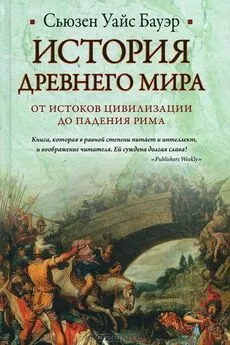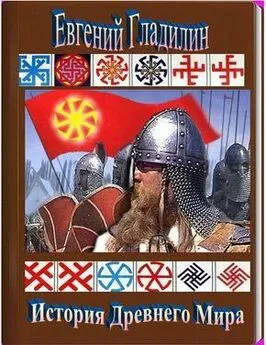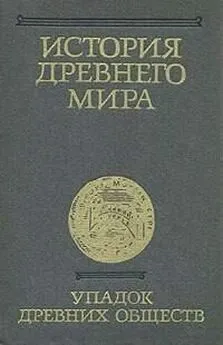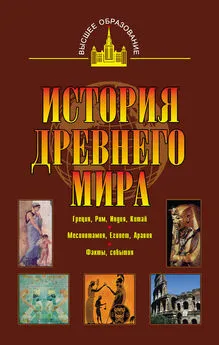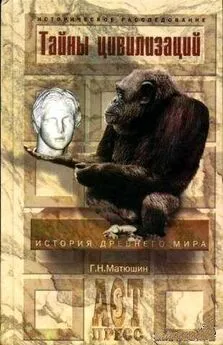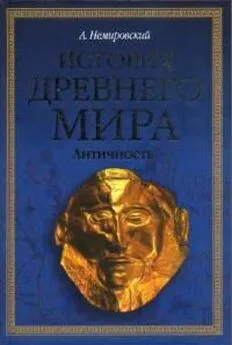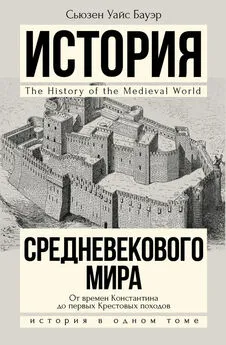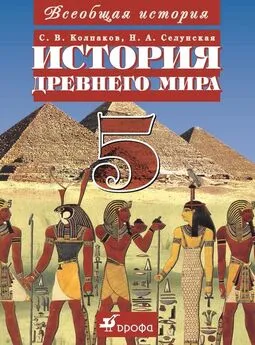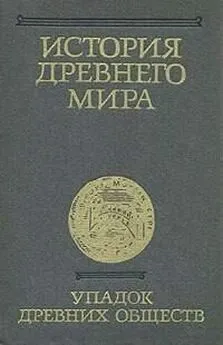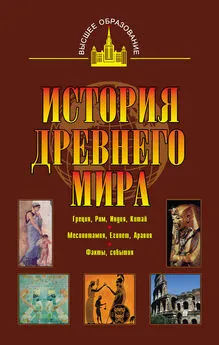Сьюзен Бауэр - История Древнего мира: от истоков цивилизации до падения Рима
- Название:История Древнего мира: от истоков цивилизации до падения Рима
- Автор:
- Жанр:
- Издательство:АСТ, Астрель
- Год:2011
- Город:Москва
- ISBN:978-5-17-057026-3, 978-5-271-37483-8
- Рейтинг:
- Избранное:Добавить в избранное
-
Отзывы:
-
Ваша оценка:
Сьюзен Бауэр - История Древнего мира: от истоков цивилизации до падения Рима краткое содержание
В этой книге Сьюзен Бауэр выдвигает и доказывает интереснейшую теорию взаимодействия и взаимопроникновения культур самых разных западных и восточных цивилизаций.
Не просто сухие факты, но подробный и яркий рассказ о внешней и внутренней политике государств древности, об их литературе, религии и мифологии, повседневной жизни и системе управления.
Результатом становится потрясающая мозаика событий, свидетельств и документов, в которой в равной степени важен каждый элемент.
История Древнего мира: от истоков цивилизации до падения Рима - читать онлайн бесплатно полную версию (весь текст целиком)
Интервал:
Закладка:
‹717›Luckenbill, Ancient Records, vol. 2, p. 417.
‹718›Kamoo, p. XXXIII; Luckenbill, Ancient Records, vol. 2, p. 419.
‹719›Herodotus, 1.103.
‹720›Christopher Johnston, «The Fall ofNineveh», Journal of the American Oriental Society 22 (1901), p. 21.
‹721›Diodorus Siculus, Bibliotheca Historica, vol. 1 (1956), p. 171; Paul Haupt, «Xenophon’s Account of the Fall of Nineveh», in Journal of the American Oriental Society 28 (1907), p. 101.
‹722›Luckenbill, Ancient Records, vol. 2, p. 420.
‹723›Nah. 2:6–10, 3:3, 3:19, NIV.
‹724›Assmann, p. 338.
‹725›2 Kings 23:29, NIV.
‹726›2 Chron. 35:21, NIV.
‹727›Luckenbill, Ancient Records, vol. 2, p. 421.
‹728›2 Kings 23:31–35.
‹729›Verbrugghe and Wickersham, p. 58.
‹730›Jer. 46:2–6, NIV
‹731›Donald B. Redford, From Slave to Pharaoh: The Black Experience of Ancient Egypt (2004), p. 146.
‹732›Josephus, The Antiquities of the Jews, 10.6.1.
‹733›Jer. 36.
‹734›Quoted in Ronald H. Sack, Images of Nebuchadnezzar: The Emergence of a Legend (2004), p. 49. Я крайне благодарна мистеру Саку за сделанную им тематическую организацию древних и классических источников по царствованиям Навуходоносора и Набонида.
‹735›Herodotus, 2.158.
‹736›Clayton, p. 196.
‹737›Herodotus, 4.42; Shaw, p. 381; Redford, Egypt, p. 452.
‹738›Herodotus, 4.42.
‹739›Josephus, Antiquities of the Jews, 10.6.2.
‹740›Sack, p. 49.
‹741›2 Kings 24; Rogerson, p. 151.
‹742›Josephus, Antiquities of the Jews, 10.7.3.
‹743›The Wadi-Brisa Inscription, in Sack, p. 16.
‹744›Verbrugghe and Wickersham, p. 58.
‹745›Saggs, Babylonians, p. 167.
‹746›Слегка сокращенный парафраз из Диодора Сицилийского: Diodorus Siculus, pp. 149–150.
‹747›Verbrugghe and Wickersham, p. 59.
‹748›Saggs, Babylonians, p. 166.
‹749›Verbrugghe and Wickersham, p. 58.
‹750›Politics 3.1276, in H. Rackham, trans., Aristotle in 23 Volumes, vol. 21 (1944).
‹751›Redford, Egypt, p. 461.
‹752›Redford, From Slave to Pharaoh, p. 146.
‹753›Clayton, p. 196.
‹754›Redford, Egypt, p. 463.
‹755›Josephus, Antiquities of the Jews, 10.7.3.
‹756›Jer. 37:7–10, NIV.
‹757›Jer. 38:4; also Josephus, Antiquities of the Jews, 10.7.3.
‹758›Letter 4, quoted in Rogerson, p. 153.
‹759›2 Kings 25:4–6, NIV.
‹760›Josephus, Antiquities of the Jews, 10.8.4.
‹761›Raymond Philip Dougherty, Nabonidus and Bekhazzar: A Study of the Closing Events of the Neo-Babylonian Empire (1929), p. 33; Herodotus, 1.74.
‹762›Herodotus 1.74.
‹763›Dan. 4:33, NIV.
‹764›Quoted in Sack, p. 44.
‹765›Matthias Henze, The Madness of King Nebuchadnezzar: The Ancient Near Eastern Origins and Early History of Interpretation of Daniel 4 (1999), pp. 96–99.
‹766›Herodotus, 1.107.
‹767›Нижеследующее взято из Геродота: Herodotus, 1.108–119.
‹768›Herodotus, 1.119.
‹769›2 Kings 25:27–29.
‹770›The Chronicle of Jerachmeel, quoted in Sack, pp. 58–59.
‹771›Verbrugghe and Wickersham, p. 60.
‹772›Quoted in Sack, p. 22. Работа Мегасфена утрачена, но она цитируется у Евсевия.
‹773›Leick, The Babylonians, p. 64.
‹774›Dougherty, p. 24.
‹775›Quoted in Oates, p. 132.
‹776›Quoted in Dougherty, pp. 72–73.
‹777›Diodorus Siculus, 2.32.2–3.
‹778›Herodotus, 1.123–126.
‹779›Ibid., 1.129–130.
‹780›Ibid., 1.75–87.
‹781›Ibid., 1.88–90.
‹782›Xenophon, The Education of Cyrus (2001), 8.2.1.
‹783›Ibid., 1.1.2.
‹784›Ibid., 1.1.5.
‹785›Ibid., 8.2.8-Э.
‹786›Ibid., 8.2.11–12.
‹787›Pierre Briant, From Cyrus to Alexander: A History of the Persian Empire (2002), pp. 38–40.
‹788›The Verse Account of Nabonidus, quoted in Sack, p. 17.
‹789›Харранская надпись Набонида, перевод Оппенгейма (Oppenheim), цит. в: Henze, pp. 59–60.
‹790›The Verse Account of Nabonidus, quoted in Sack, p. 18.
‹791›Gene R. Garthwaite, The Persians (2005), p. 29.
‹792›Herodotus, 1.189.
‹793›Xenophon, Education of Cyrus, 8.5.13.
‹794›Колонна Кира, насколько сжатый вариант перевода из: Dougherty, pp. 176–168.
‹795›Ezra 1:1–3, NIV.
‹796›Ezra 3:12–13, NIV.
‹797›Herodotus 1.164–165.
‹798›A. Trevor Hodge, Ancient Greek France (1998), p. 19.
‹799›Barry Cunliffe, The Extraordinary Voyage of Pytheas the Greek: The Man Who Discovered Britain (2002), p. 16.
‹800›Daithi O’Hogain, The Celts: A History (2002), p. 1.
‹801›Ibid., p. 2.
‹802›Hodge, pp. 5, 190–193.
‹803›Heurgon, p. 13.
‹804›David Soren et. al., Carthage: Uncovering the Mysteries and Splendors of Ancient Tunisia (1990),
‹805›Politics, 3.1280, Rackham, Aristotle in 21 Volumes, vol. 21.
‹806›Heurgon, p. 13.
‹807›Amaldo Momigliano, «An Interim Report on the Origins of Коте», Journal of Roman Studies 53:1–2 (1960), pp. 108–109.
‹808›Livy, Early History of Rome, 1.41–43.
‹809›Ibid., 1.47.
‹810›This quote and the following from Livy, Early History of Rome, 2.10.
‹811›Thomas Babington Macaulay, «Horatius: A Lay Made About the Year of the City CCCLX», строфа 27.
‹812›Polybius, The Rise of the Roman Empire (1979), 3.22.
‹813›Livy, Eariy History of Rome, 5.34.
‹814›O’Hogain, p. 2; Bernhard Maier, The Celts: A History from Earliest Times to the Present (2003), pp. 44–45.
‹815›Polybius, Rise of the Roman Empire, 2.17.
‹816›Maier, p. 24; O’Hogain, p. 7.
‹817›Cunliffe, pp. 19–20.
‹818›Epitome of the Philippic History, quoted in Maier, p. 38.
‹819›Mackay, pp. 26–28.
‹820›Livy, Early History of Rome, 2.17–19.
‹821›Edgerton, p. 54.
‹822›Thapar, Early India, p. 152.
‹823›The Laws of Manu, translated by Georg Buhler (1970), 1.93–100.
‹824›Jan Y. Fenton et al., Religions of Asia (1993), pp. 46–48.
‹825›Thapar, Early India, pp. 146–148.
‹826›Rig Veda 10.90, in Edgerton, p. 68.
‹827›Wolpert, p. 39.
‹828›Thapar, Early India, p. 149.
‹829›Fenton et al., p. 90.
‹830›Из введения к: J a taka, 1.54, translated by Henry Clarke Warren in Buddhism in Translation (1896), pp. 56–61.
‹831›Quoted in Michael Carrithers, Buddha: A Very Short Introduction (2001), p. 46.
‹832›Ibid., p. 62.
‹833›Karen Armstrong, Buddha (2004), p. 9.
‹834›Ibid., p. xi.
‹835›A. L. Basham, The Wonder That Was India (1963), p. 47.
‹836›Thapar, Early India, p. 152.
‹837›Xueqin, p. 5.
‹838›Gai Shiqi, ZuozhuanJishibenmuo, vol. 45 (1979), quoted in Xueqin, p. 170.
‹839›Ch’ien, p. 77.
‹840›Cho-yun Hsu, Ancient China in Transition: An Analysis of Social Mobility, 722–222 BC (1965), pp. 59–60.
‹841›Jonathan Clements, Confucius: A Biography (2004), pp. 10–15. Я благодарна мистеру Клементсу за сведение беспорядочных подробностей жизни Конфуция в единый хронологический список.
‹842›Clements, pp. 21–22.
‹843›James Legge, trans., The Sacred Books of the East, vol. 27: The Texts of Confucianism, Li Ki, 1-Х (1968), 17.9.6.
‹844›Ibid., 2.1.7.
‹845›Ibid., 3.2.1,12.
‹846›James Legge, trans., Confucian Analects, The Great Learning, and the Doctrine of the Mean (1971), 7.19.
‹847›Ibid., 1.1.
‹848›Ibid., 3.1,3.
‹849›Clements, p. 39.
‹850›Ch’ien, p. 787.
‹851›Jaroslav Prusek, Chinese Statelets and the Northern Barbarians in the Period 1400–300 BC (1971), p. 187.
‹852›Hsu, p. 69.
‹853›Sun-Tzu, The Art of War, translated by Lionel Giles (2002), 2.6.
‹854›Ibid., 3.2.
‹855›Ibid., 2.2–4.
‹856›Ibid., 1.18–19.
‹857›Ibid., 9.24, 26.
‹858›Quoted in Xueqin, p. 7.
‹859›Herodotus, 1.216.
‹860›Ibid., 1.214.
‹861›Ibid., 4.159.
‹862›Ibid., 2.161.
‹863›James Henry Breasted, Ancient Records of Egypt: Historical Documents from the Earliest Times to the Persian Conquest (1906–1907), 4.1000, pp. 510–511.
‹864›Herodotus, 2.162.
‹865›Breasted, Ancient Records, 4.1003, p. 511.
‹866›Ibid., 4.1005, p. 512.
‹867›J. M. Cook, The Persian Empire (1983), p. 46.
‹868›Briant, p. 57.
‹869›Herodotus, 3.64–66.
‹870›J. M. Cook, Persian Empire, p. 50.
‹871›Herodotus, 3.72.
‹872›Maria Brosius, trans, and ed., The Persian Empire from Cyrus II to Artaxerxes I (2000), p. 21.
‹873›Ibid., p. 48.
‹874›Ibid., p. 23.
‹875›J. M. Cook, Persian Empire, p. 53.
‹876›Brosius, pp. 32–33.
‹877›Ezra 5:3–9, NIV.
‹878›Basham, p. 47.
‹879›Thapar, Early India, p. 154.
‹880›Keay, p. 67.
‹881›Ibid.
‹882›Thapar, Early India, p. 155.
‹883›Herodotus, 4.44.
‹884›Olmstead, History of the Persian Empire, p. 145; Herodotus, 3.94 and 4.44; Brosius, p. 40.
‹885›Olmstead, History of the Persian Empire, p. 145.
‹886›Herodotus, 4.127.
‹887›Ibid., 4.64–65, 73–75.
‹888›Ibid., 4.89.
‹889›The Persians, in Aeschylus, The Complete Plays, vol. 2, translated by Carl R. Mueller (2002), p. 12
‹890›Herodotus, 4.126,131.
‹891›Briant, p. 144.
‹892›Herodotus, 5.3.
‹893›Morkot, p. 65.
‹894›Peter Green, Alexander of Macedon, 356–323 BC: A Historical Biography (1991), pp. 1–2.
‹895›Herodotus, 5.18.
‹896›Waterfield, p. 51.
‹897›Solon 29, in Plutarch, Greek Lives, p. 73; Athenian Constitution, in Rackhain, Aristotle in 23 Volumes, vol. 20, sees. 13–14.
‹898›Solon 29, in Plutarch, Grer Lives, p. 74.
‹899›Herodotus, 1.61.
‹900›Athenian Constitution, in Rackham, Aristotle in 23 Volumes, vol. 20, sec. 15.
‹901›Ibid., sec. 16.
‹902›Ibid., sec. 19
‹903›Lycurgus 16, in Plutarch, Greek Lives, p. 26.
‹904›Pomeroy et al., p. 152.
‹905›Herodotus, 5.73.
‹906›Athenian Constitution, in Rackham, Aristotle in 23 Volumes, vol. 20, sec. 21.
‹907›Politics, in Rackham, Aristotle in 23 Volumes, vol. 21,1302b; Buckley, p. 145.
‹908›Herodotus, 5.97.
‹909›Ibid., 5.96.
‹910›Ibid., 5.99.
‹911›Buckley, pp. 161–162.
‹912›H. T. Wallinga, «The Ancient Persian Navy and its Predecessors», in Achaemenid History I: Sources, Structures, and Synthesis, ed. Heleen Sancisi-Weerdenburg (1987), p. 69.
‹913›Herodotus, 5.102.
‹914›Herodotus, 5.103.
‹915›H. T. Wallinga, in Sancisi-Weerdenburg, p. 69.
‹916›Herodotus, 6.17.
‹917›Herodotus, 6.19.
‹918›Herodotus, 6.112.
Читать дальшеИнтервал:
Закладка:
